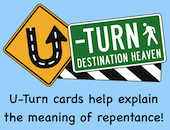7 Questions You Can't Ask In Church
Membership Level› Guest
Author/Source: Roger Fields
Topic: Humor, Questions
Do you know God's commands for your life? Or are you just misunderstanding them?

I am a conservative Christian who believes that the entire Bible is inspired by God and inerrant. As such, we conservative, Bible-believing Christians tend to think alike. It’s called “group-think.”
Consequently, there are Bible questions that are off limits. There are certain questions that are not welcome in church environments.
So be careful. Start asking any of these UNCENSORED questions in your church and you could be in BIG trouble.
YOU HAVE BEEN WARNED.
1. If DISCIPLESHIP is such a big deal, then why didn’t Paul ever mention it?
Do NOT ask your Minister of Discipleship this question. His whole world revolves around discipleship programs.
Today, we have discipleship programs, discipleship manuals and even ministers of discipleship. All kinds of prayer manuals, Bible reading/memorization programs, giving plans, etc. all come under the umbrella of discipleship. But consider.
Paul the Apostle was the central writer and church planter of the New Testament. Jesus knocked him off his horse and called him to take the Gospel to the gentiles. Yet Paul never once mentions one of our most cherished doctrines: discipleship. He never even used the word “disciple.” Never. As a matter of fact, none of the New Testament writers used the words “disciple” or “discipleship” after the cross.
But you protest, “Jesus told us to go make disciples.” True. But the book of Acts refers to EVERY believer in Jesus as a disciple. It seems that the crucifixion and resurrection of Jesus changed everything. Apparently, once someone receives Jesus he not only receives salvation as a gift, God considers him a disciple by His grace. Amazing. So instead of a disciple being a super-Christian who daily carries His cross, a disciple seems to be an ordinary believer who received Jesus.
When they had preached the GOSPEL to that city and had made MANY DISCIPLES, (acts 14:21 ESV)
Check out some of these other verses in Acts where it seems every believer was referred to as a “disciple.” (Acts 6:1, 9:1, 9:26, 11:26, 11:29, 13:52, 14:20, 18:23, 19:1, 21:4) The book of Acts never distinguishes between a “disciple” and a “believer.”
The Gospel (good news) produced the disciples (ordinary believers). There was no intense Christian training program. They simply grew in grace and knowledge of the Lord (2 Peter 3:18 ESV). James even warned about adding anything to God’s grace.
Now, therefore, why are you putting God to the test by placing a YOKE ON THE NECK OF THE DISCIPLES that neither our fathers nor we have been able to bear? But we believe that we will be SAVED THROUGH THE GRACE of the Lord Jesus, just as they will. (Acts 15:10,11 ESV)
Their yoke at that time was circumcision. We have a whole array of yokes today that we put on believers under the name of discipleship.
Being a disciple may not be the hunker-down-try-harder definition that we have given it. Has “discipleship” become a trojan horse that lets in religious obligations that attack freedom in Christ? Instead–like everything else in the Gospel–is being a “disciple” something God conveys on us by His grace?
2. Why are there no SCHEDULED SERVICES in the New Testament?
Do NOT ask your lead pastor this question. The church schedule is very important to him.
Early believers met in the temple, synagogues, house to house and some other public areas. But there is no mention of a scheduled day/time of services. Even Jesus never said, “Ok, I’m going to go over some Christian principles Sunday morning by the Sea of Galilee. See you there at 10:30 sharp.” There is nothing wrong with scheduling your worship services but the early church was more organic than today’s church. We forget the power of spontaneous gatherings that might only include 2 or 3 people.
For where two or three are gathered in my name, there am I among them. (Matthew 18:20 ESV)
Scheduled services/gatherings/meetings are fine. Just don’t assume someone has left the faith if they don’t join in with everything on the church schedule. Could it be that Jesus builds His church through interconnected relationships that go beyond our institutions?
3. Why didn’t the New Testament writers QUOTE JESUS?
Do NOT ask this in a Bible study. You will be ignored or ridiculed.
Actually, they quoted Jesus once. Only once. It was the time He explained what the Lord’s Supper was all about (1 Corinthians 11:23-26). But amazingly, they never quoted from the Sermon on the Mount, the parables or any other teachings of Jesus. Why? It could be that they were more focused on the living Jesus, the One that resurrected and was living among them, than the historic Jesus. They emphasized the living Lord rather than the bearded/sandaled Jesus who walked around Galilee. Maybe that was what Paul was talking about in 2 Corinthians 5.
From now on, therefore, we regard no one according to the FLESH. Even though we once regarded Christ according to the FLESH, we regard him thus no longer. (2 Corinthians 5:16 ESV)
Paul no longer thought in terms of the historic Jesus in the flesh, but the resurrected Jesus. You know, the same living Lord who knocked him off his horse on the road to Damascus. Could it be that our relationship with Jesus goes beyond the historical Jesus and connects with the resurrected, living Lord?
4. Why doesn’t the Bible tell us to “CHANGE THE WORLD?”
Do NOT ask your student pastor this question. They are all about inspiring teens to change the world.
They tell us from youth group on up that we can/should change the world. But is that everyone’s mission, to do something magnificent?
As Christians, we have developed a high opinion of ourselves. We have become a little cocky. We get intoxicated on self-importance and every ministry tends to think of itself as indispensable. Let’s step back.
There are two problems with the “world changer” approach to ministry.
1. First, Jesus told us to take the gospel into the world. He never told us to change the world. The people who receive the gospel are changed (Actually, transformed. There is a difference.) but the “world” is not changed.
2. Second, the world has stayed mostly the same—except for technological progress–for a few thousand years. Even though the church has spread around the globe and Christians have done amazing things to make people’s lives better, the world is still a mess.
If you were of the world, the world would love you as its own; but because you are not of the world, but I chose you out of the world, therefore the world hates you. (John 15:19 ESV)
Jesus doesn’t sound optimistic to me about changing the world.
The kingdom of the world has become the kingdom of our Lord and of his Christ, and he shall reign forever and ever. (Revelation 11:15 ESV)
That sounds optimistic to me. When Jesus returns He will change the world as the kingdoms of the world come under the rule of God’s Kingdom. That’s when the world will change, really change.
Until then, here’s the question. Is there a God for ordinary people who will never change anything more than a diaper?
5. Why didn’t Jesus do anything for the POOR?
Ask this question and everyone will assume you have no heart.
Except for feeding the 5000 lunch one day, Jesus never did much for the poor. He never started a food pantry, a clothing bank or a homeless shelter. We know He had money because He had a treasurer, Judas. He owned an expensive, seamless robe. Judas was annoyed when Jesus allowed a woman of questionable reputation to bust open expensive perfume and anoint His feet. Judas wanted the perfume sold and the money given to the poor.
Mary therefore took a pound of expensive ointment made from pure nard, and anointed the feet of Jesus and wiped his feet with her hair. The house was filled with the fragrance of the perfume. But Judas Iscariot, one of his disciples (he who was about to betray him), said, “Why was this ointment not sold for three hundred denarii and given to the poor?” He said this, not because he cared about the poor, but because he was a thief, and having charge of the moneybag he used to help himself to what was put into it. Jesus said, “Leave her alone, so that she may keep it for the day of my burial. For the poor you always have with you, but you do not always have me.” (John 12:3-8 ESV)
It’s not that Jesus didn’t care about the poor. He did!
In the book of Acts, the church made sure they took care of those in need among them. But Jesus was/is something more than a middle eastern social worker. “Social justice” was never His focus. Could it be that Jesus had bigger plans in mind?
6. Why does the Bible say virtually nothing after the cross about SERVING THE LORD?
Do NOT ask this out loud at any church function.
I was taught that our lives should be consumed with serving the Lord. Let’s take another look. Jesus made it clear that He did NOT come to be served. He never revoked that statement. He never updated it.
Even as the Son of Man came NOT TO BE SERVED but to serve, and to give his life as a ransom for many.(Matthew 20:28 ESV)
The gospel is not about what you do for God; it is about what God did for you through the crucifixion of Jesus. After the cross, we are told to serve others, but only once commanded to serve God (Romans 12:11 ESV). So it is not that we do not serve God, but the Gospel always emphasizes how God served us.
Remember how Peter freaked out when Jesus served him by washing his feet (John 13:1-11). Peter wanted to do the serving but Jesus would not let him. Peter needed Jesus more than Jesus needed Peter. The same is still true. We need the Lord more than the Lord needs us.
Paul made this clear to the men of Athens.
The God who made the world and everything in it, being Lord of heaven and earth, does not live in temples made by man, nor is he served by human hands, as though He needed anything, since He himself gives to all mankind life and breath and everything. (Acts 17:24,25 ESV)
P.T. Forsythe said it well a hundred years ago.
“Christianity is not the sacrifice we make, but the sacrifice we trust.” (P.T. Forsythe)
Remember, through Jesus, God is your good Father, not your employer. He is not waiting around for you to do farm chores. That’s the mistake the prodigal son and his older brother both made. They saw their father as their farm boss instead of their dad.
Could it be that God is more interested in being our good Father than in being our employer?
7. Why didn’t Paul ever instruct people to FOLLOW CHRIST?
Do NOT ask this question in any church with a mission statement that includes “making followers of Christ,” That’s a lot of them.
Being a “follower of Christ” was not the language of the New Testament after Jesus died and rose again. People literally followed Jesus as He walked through Galilee. After the cross, the terms changed. 190 times after the cross, believers are referenced as being “in Christ” or “in Him.” They were never called “followers of Christ.”
Only once does Paul use the word “follow.” He says to follow him as he follows Christ with regards to suffering. In other words, Jesus had opposition. I have opposition. You will have opposition. That’s it. Paul never says you need to be a follower of Christ in the same way people followed Him before the cross.
That is a game-changer.
Busted by Chloe’s people. Have you read what Chloe did?
For it has been reported to me by Chloe’s people that there is quarreling among you, my brothers. What I mean is that each one of you says, “I follow Paul,” or “I follow Apollos,” or “I follow Cephas,” or “I follow Christ.” (1 Corinthians 1:11,12 ESV)
As you read on you will notice what Paul did NOT do. He did not clear up the confusion by telling them that they should all just “follow Christ.” That would be the simple thing to do. Instead he goes on to say they are ALL being divisive. Then he lays out the real emphasis of his message, the cross. Don’t make me send Chloe over there!
For Christ did not send me to baptize but to preach the gospel, and not with words of eloquent wisdom, lest the cross of Christ be emptied of its power. (1 Corinthians 1:17 ESV)
Wow! The message here is that when we emphasize “following” Christ, or anyone else, we miss the power of the cross.
Jesus gave His life for us. Through faith in Him, He places us IN HIMSELF. “Following” implies distance. You follow what is ahead. But now there is no distance between you and Christ. You are not a tag-along. You are IN Him.
Therefore, if anyone is IN CHRIST, he is a new creation. The old has passed away; behold, the new has come. (2 Corinthians 5:17 ESV)
You are in Him. There is now no need to “follow” Christ. You are in Christ. He will live through you and produce fruit through His life within. Could it be that we have a closer connection with Jesus than even the people who followed Him around Galilee?
CONCLUSION
Over years of ministry I have met too many worn out Christians. They are trying to live up to a standard that God never imposed on them. I hope this helps them relax, rest and breathe.
None of these questions–or my understanding of them–is meant be to the final word.
However, maybe it is time that we reexamine some of our tightly held beliefs and start some new discussions.












